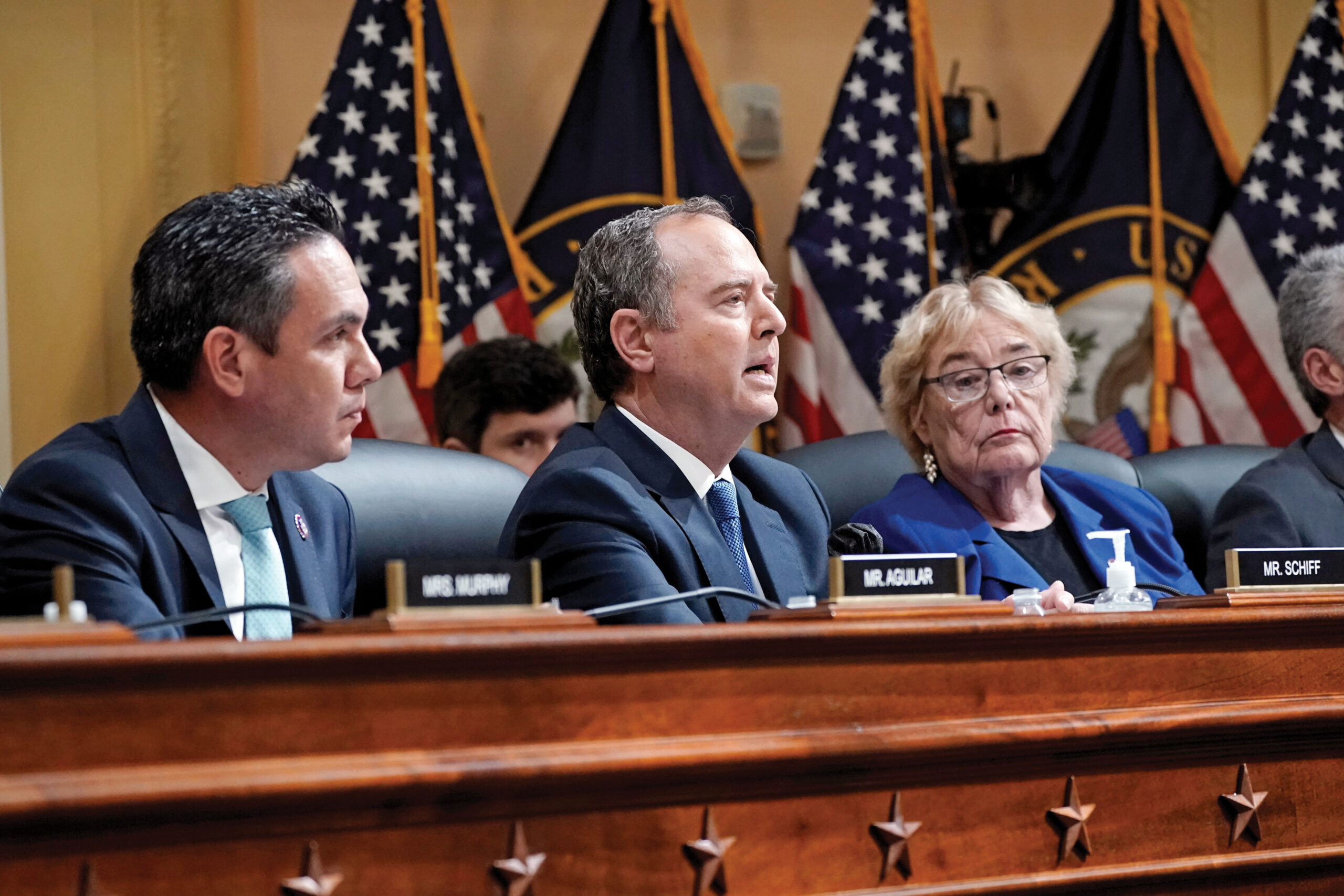Republicans have an opportunity. With a seriousness of purpose, they can demonstrate to a skeptical electorate something that has long been missing at the federal level: a basic ability to govern. Voters are deeply dissatisfied with the direction of the country. The RealClearPolitics polling average shows 65% believe the United States is on the wrong track, but individual surveys show that number reaching as high as 72% in mid-November.
That is consistent with what nearly 3 out of 4 voters said in the exit polls conducted during the midterm elections. A 41% plurality was dissatisfied with the way things were going in the country, while 33% were angry. Only 20% were satisfied, and a scant 5% were enthusiastic — and that’s with a heavy partisan tilt to the results, in which large majorities of Democrats expressed a favorable opinion of the status quo.
Republicans could make clear to the voting public that they would like to chart a different course. Yet the GOP’s opportunity is far more limited than it ought to be because it failed to make this case convincingly enough during the midterm elections, leaving the party with a slender majority in just one chamber of Congress.

This is despite the fact that a working majority against the incumbent Democratic Party was and still is ripe for the taking. Just 41% of those who turned out had a favorable view of President Joe Biden, while 56% viewed him unfavorably. Two-thirds do not want him to run for reelection in 2024. Partisan Democrats are alienated from the rest of the country in professing to believe things are going well. Seventy-five percent of Democrats said their families had experienced no hardship as a result of inflation, according to the exit polls, in contrast with 79% of voters who described moderate to severe hardship.
A Republican Party that focused its message on prudent stewardship of taxpayer resources, sound money rather than rampant inflation, public safety in the face of rising violent crime, parental involvement in education as opposed to unaccountable union-controlled bureaucracies, a secure border instead of chaotic and unregulated mass migration, and an informed patriotism that rejects wokeness and its excesses — that party could have unleashed a red wave. We saw such candidates win a year ago in places Biden had carried by double digits in 2020, and many similar contenders prevailed this year.
House Minority Leader Kevin McCarthy (R-CA), the man most likely to become the next speaker, said after a meeting at the White House that he had a three-pronged message for Biden: Secure the border, end COVID-19 vaccine mandates for military personnel, and curb reckless federal spending. At least some of that is what people thought they were voting for when they gave Republicans the House.
Just because a possible governing majority exists does not mean that it is guaranteed, however. Republicans appearing on the midterm ballot overwhelmingly espoused a platform much like the program described above. But in too many cases, they were also associated with ugly performative aspects of politics that increasingly make voters wary and weary. Cable news segments and social media trends have become a shortcut for lawmakers who would do more for their country if they devoted more time to policymaking and legislating.

The unexpectedly close race for Congress, in which Democrats retained control of the Senate, should be taken as a course correction for Republicans. Already, important figures inside the GOP are encouraging a reassessment of everything from the party’s handling of mail-in voting in a world where it has suddenly become ubiquitous to the prominent role played by former President Donald Trump.
The dangerous temptation for the party leaders with a small House majority and without reinforcements in the White House or the Senate will be to do what is easy and unimpressive, not what is difficult and impressive. Republicans will not be able to advance legislation other than for messaging purposes without bipartisan support or a willing signer of bills in the Oval Office. But they will immediately assume committee chairmanships and gain subpoena power. As a result, the early and discouraging indications are that the House GOP majority is going to spend much of its time investigating Democrats. The GOP should certainly not abandon its oversight responsibilities, but it will fail with voters if it concentrates on them to the exclusion of policymaking and presenting itself as a party fit for government.
McCarthy began during a trip to the beleaguered southern border with an ironclad pledge to investigate, and possibly try to remove, Department of Homeland Security Secretary Alejandro Mayorkas for his role in the long-simmering immigration crisis. “We never do impeachment for political purposes. We’re having an investigation. We know exactly what Mayorkas has done,” McCarthy said. “If the investigation leads to an impeachment inquiry, we will follow through.”
Impeachment is therefore on the agenda, if not for Biden then a leading subordinate.
“We must be relentless in our oversight of this administration,” Rep. Steve Scalise (R-LA), who as the second-ranking Republican in the House is in line to become majority leader in the next Congress, wrote in a letter to colleagues. “From the politicization of the Justice Department to the job-crushing regulations coming from every agency, we need to shine a bright light on the actions and policy failures of this administration.”
This includes the shady foreign business dealings of the president’s son Hunter Biden. “We are going to make it very clear that this is now an investigation of President Biden,” Rep. James Comer (R-KY), who is slated to ascend to the top of the House Oversight Committee, has been quoted as saying.
OHIO: THE SWING STATE THAT WAS
All of these things are legitimate subjects of public inquiry. This includes the improbable international business misadventures of Hunter Biden, whatever the heads of the major social media platforms may say. There are many people inside and adjacent to the Biden administration with a great deal to answer for, and congressional oversight of the executive branch is an important part of its constitutional mandate.
At the same time, it is surely more important to be seen as alleviating job-crushing regulations, turning the page on outdated COVID-19 mandates, securing the border, and fulfilling myriad campaign promises than to hold endless hearings designed to symbolize those commitments. Increasingly, these proceedings manage only to inflame the passions of the already convinced, set up legal disputes testing the separation of powers among the elected branches of government, and leave little lasting impression on anyone else. It is time to move on past the performative and get real.
A segment of the voters who delivered Republicans the House in the first place was impervious, if not specifically opposed, to long-running show trials designed to score political points against easily demonized electoral rivals. That isn’t to say there aren’t legitimate investigations that can be done into the Capitol riot of Jan. 6. It is to acknowledge, as some Jan. 6 committee staff members have, that the finding of relevant facts and uncovering of new information is secondary at best to the mission of such prime-time television programming.
To make continuing the television drama, albeit with a different cast of heroes and villains at the center, central to the purpose of a new House Republican majority would therefore miss the point.
GEORGIA’S ELECTION REFORMS MADE IT EASIER TO VOTE
While this should not deter proper congressional investigations or overdetermine the Republican agenda or message, we know what the White House’s response will be to this approach.
“Congressional Republicans ran saying that they were going to fight inflation. They said that they were going to make that a priority — they were very clear about that these past several months,” White House press secretary Karine Jean-Pierre told reporters at a daily briefing. “Instead, what they are doing is they’re focusing … they’re making their top priority — they get the majority, and their top priority is actually not focusing on the American families but focusing on the president’s family.”
“They’re not coming up with solutions on how we’re going to lower costs for American families. They’re not coming up with solutions as how we’re dealing with issues that matter most to American families,” Jean-Pierre said.

In truth, the House Republican majority will offer a partial solution to high inflation simply by its very existence. Absent Democratic control of the House, Biden’s party will not be able to originate tax or spending bills. Democrats will also not be able to resort to budget reconciliation, subjecting every piece of legislation to the filibuster in the Senate in addition to the need to win GOP votes to get out of the House.
Not only will party-line legislation come to an end — so will the slew of trillion-dollar spending plans, enacted under radically different circumstances than prevailed during the low point of the pandemic and its associated economic disruption, which are the most inflationary things Biden has done since taking office.
Still, Republicans shouldn’t want to facilitate the White House’s messaging of the new majority as purely political rather than public-spirited. It should be clear in all that the objective and efforts of the new majority are to dig the country out of messes inherited from Biden and the last majority. Only then will the contrast with Democrats, still consumed with Trump years after his departure from the White House, be clear. If Republicans plunge into two years of retributive investigations, they will lose.
We have all seen how Democratic administrations respond to divided government. They cast the Republicans as the party of default, government shutdowns, mindless obstructionism, and economic nihilism. They make fiscal responsibility seem irresponsible. And they reap the political rewards during a presidential election year rebound, following far more impressive gains by House Republicans than any of this year’s crop of GOP candidates enjoyed.
THE RATE OF BLACK HOMICIDE VICTIMS HAS RETURNED TO 1990S LEVELS
Biden, who served two terms as vice president during then-President Barack Obama’s frequent skirmishes with congressional Republicans at the height of the Tea Party era, previewed these lines of argument before the elections had come to an end.
“They’re coming after your Social Security and Medicare,” Biden said at a political fundraiser. “Republicans have made it clear — and they’ve said it publicly — that if they win control of the Congress, they’re going to shut down the government and refuse to pay America’s bills for the first time in history unless I cut Social Security and Medicare.”
“They’re so determined to cut Social Security and Medicare, they’re willing to take down the American economy over it because that’d be the one thing to put us in a deep recession,” he continued.
“They’ve also said that if they don’t get Medicare and Social Security on the chopping block, that they will hold our debt hostage, which would spiral the economy into a downward turn,” Biden’s White House press secretary elaborated. “That is the plan of the congressional Republicans. It’s to make the economy worse, not better.”
None of this will go away now that Republicans have secured the House. And pushing back against it won’t get any easier for the eventual speaker, who will need votes from every faction of the GOP conference to get anything done. Much of Washington on both ends of Pennsylvania Avenue will be focused on 2024 from the day the new Congress is seated.
What is unmistakably clear is that Republicans will need to do some preaching to the not already converted to consolidate and then build on the gains that were made during the midterm elections. That means paying attention to the voters who got away. Independents were closer to Republicans than Democrats in their assessment of the economy and state of the country, yet they nearly split down the middle, slightly favoring Democrats 49% to 47%.
Voters who somewhat disapproved of Biden’s performance in office swung back and forth between the two parties on the same ballots, according to an NBC News analysis. In New Hampshire, Republican Gov. Chris Sununu won these voters by 20 points. But Sen. Maggie Hassan (D-NH) carried them by 45. A similar dynamic played out in Nevada, where successful Republican gubernatorial nominee Joe Lombardo won these voters by 8 points, but Sen. Catherine Cortez Masto (D-NV) did, too, by 3.
We don’t know the results of the Georgia Senate runoff as this is being written. But in November, Gov. Brian Kemp (R-GA) won voters who somewhat disapproved of Biden by 16 points, while Republican Herschel Walker lost them by 8 in the first round of his race against Sen. Raphael Warnock (D-GA). That’s a staggering difference in three contests for Democratic-held seats in a year when Republicans needed a net gain of one to win the Senate.
It’s not simply the case that these voters preferred Republican gubernatorial candidates to Senate candidates either. Sen. Ron Johnson (R-WI) won them on his way to reelection, while Democrats held the governorship with their help.
CLICK HERE TO READ MORE FROM THE WASHINGTON EXAMINER
Republicans must be mindful of conservative enthusiasm. They can lose elections with a demoralized base as surely as an inability to reach beyond the party faithful. But the voters who would be satiated by a vengeful or entertaining approach to the new majority are already squarely in the GOP column. Other votes are needed to do something that eluded past Republican majorities after even stronger election cycles: keep building.
That means trusting the voters will recognize a sober governing alternative to Biden if it is presented to them, even and perhaps especially if Democrats elsewhere in the government mindlessly obstruct it.
W. James Antle III is the Washington Examiner’s politics editor.
